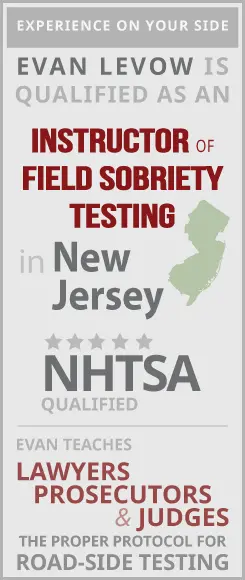If you have been charged with driving while intoxicated (DWI) or driving under the influence (DUI) based on ingestion of a controlled dangerous substance, you may be able to present strong challenges against the charges.
Can I Fight A New Jersey DWI Involving Drugs?
The “science” behind assessing suspects believed to be under the influence of drugs is highly questionable, and it has not been recognized yet by the New Jersey courts as scientifically reliable. In order to admit such evidence against you, the prosecutor would first have to demonstrate its scientific reliability prior to the court being able to consider it.
Accurately recognizing drug impairment is extremely difficult, and even moreso when this recognition must be “scientifically reliable.” Mistakes can be made at any point during the process, and just one mistake can completely invalidate the evaluation as evidence.
Challenging Drug Recognition Evaluation Results
Evan M. Levow has been trained in the Drug Recognition Evaluation (DRE) program used by the National Highway Traffic Safety Administration (NHTSA) and local police departments to assess “drugged driving”. He completed a three day course taught by an NHTSA-certified DRE instructor.
This valuable knowledge allows him to effectively challenge the evidence against clients charged with DWI, and achieve successful results.
In some cases, this is a matter of proving that the DRE itself was conducted improperly. The Drug Recognition Evaluation is a 12-step process, and each step is required:
- A breath test to rule out alcohol as the major cause of impairment;
- An interview of the arresting officer by the drug recognition expert (The effects of some drugs are short-lived. An interview with the arresting officer is essential in order to give the drug recognition expert a clear idea of what symptoms were observed at the roadside, or place of first contact with the subject.);
- A preliminary examination of the subject;
- An eye examination (The subject’s eyes are examined for involuntary jerking when looking to the side or looking up following a stimulus from side to side or up and down. The ability of the subject’s eyes to converge is also tested.);
- A series of divided-attention tests (These standardized tests check the subject’s ability to multitask. Subjects are asked to: listen to instructions while maintaining a stance, maintain a stance with eyes closed, walk a straight line, turn in a prescribed way and walk back, stand on one foot in a prescribed way for a certain amount of time, and touch the tip of their nose with the tip of their finger as instructed. These tests are usually easy to complete when sober, but difficult or impossible when impaired by a drug or alcohol.);
- The examination of vital signs (Blood pressure, temperature and pulse are taken.);
- A darkroom examination of pupil sizes (This includes an examination of the subject’s nasal and oral cavities.);
- A check of muscle tone;
- An examination of typical injection sites on the person’s body;
- The rendering of an opinion by the drug recognition expert;
- An interview with the subject;
- And the provision of a bodily fluid sample.
If any one of these steps was missed, or administered incorrectly, your DRE results could be thrown out.
Additional Grounds For Dismissal
Evan has also been able to dismiss evaluations on other grounds, including:
- how the officer assessed you through observation and measurement of vital signs, including blood pressure, pulse and body temperature;
- how the officer assessed your condition based on the seven drug categories identified in the DRE Training Program;
- how the officer administered the Standardized Field Sobriety Tests, including Horizontal Gaze Nystagmus;
- how the officer administered eye examinations, including pupil size, vertical nystagmus and lack of convergence;
- whether the officer properly classified the drug under the seven drug categories;
- whether the officer properly completed the DRE course.
Evan Levow is also a Standardized Field Sobriety Testing Instructor, qualified by NHTSA and the International Association of Chiefs of Police (IACP).
Contact A New Jersey DUI Lawyer
Led by nationally-recognized expert Evan Levow, Levow DWI Law, P.C. is a practice of four experienced attorneys dedicated to representing only clients charged with DUI and DWI in the State of New Jersey. You can learn more about our recent legal victories here.
To schedule a free consultation, call 1-877-735-2288 or complete our contact form.


